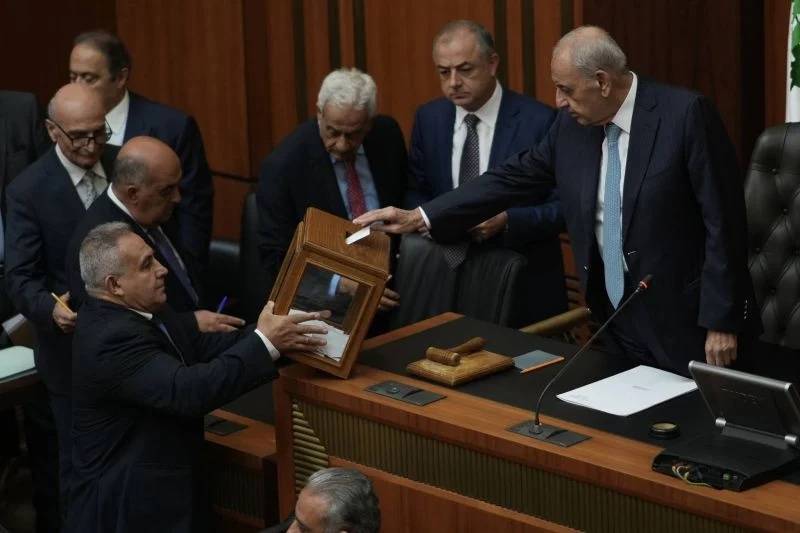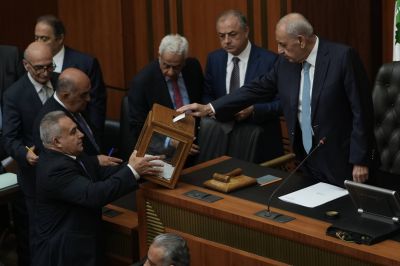
Parliament Speaker Nabih Berri places his ballot in the ballot box during the electoral session of June 14, 2023. On his left is Deputy Speaker Elias Bou Saab. (Credit: Mohammad Yassin)
Holding early parliamentary elections to end the political stalemate?
There’s nothing shocking about this suggestion in a true parliamentary democracy, since the legislature’s dissolution is the norm in the event of deadlock.
But it’s a different story in Lebanon. With democratic process having long since been swapped for a form of outside-the-chamber consensus politics, Deputy Parliament Speaker Elias Bou Saab’s call for early elections in the midst of a presidential vacuum seems to carry a number of political messages for a variety of recipients.
Bou Saab is reputed to be close to Parliament Speaker Nabih Berri, the main opponent of Gebran Bassil, leader of the Free Patriotic Movement (FPM) bloc to which Bou Saab belongs.
A game-changer?
On Friday, following a meeting with Berri, Bou Saab called for new elections. “I suggested to Mr. Berri that we hold early parliamentary elections in case we fail to elect a president,” he said.
Although he is a member of the FPM parliamentary bloc, he has demonstrated that he is not shy about flying in the face of his party’s instructions. With this room for maneuver, he went against the FPM’s instructions to vote for Jihad Azour, by supporting Sleiman Frangieh, the Hezbollah and Amal presidential candidate, during the last presidential electoral session.
The decision to back Azour almost broke up the FPM bloc, notably due to the opposition of MPs, including Bou Saab and FPM founding members such as Alain Aoun and Simon Abi Ramia.
Bassil even accused Hezbollah of interfering in the FPM’s internal affairs and inciting certain MPs to mutiny.
“The current Parliament is not capable of electing a president, especially if there is no real dialogue,” a source close to Berri told L’Orient-Le Jour.
He added, “We’re weighing up the pros and cons, but Elias Bou Saab’s proposal [to call elections] would perhaps rid the Parliament of a few elected representatives who are unaware of their responsibilities as MPs, and would be an opportunity to see the emergence of a real parliamentary majority.”
The May 2022 elections produced a split Parliament: Hezbollah and its allies, including the FPM) won 61 seats, short of the 65 that make up the majority. The opposition camp, for its part, has some 42 MPs, while the remaining 25 are in a gray zone.
Could early elections change all this? Experts believe that the results could be unfavorable for certain blocs. “The opposition, especially the Change MPs, could lose votes, especially if the diaspora is not mobilized as it was the case in 2022,” said election researcher Mohammad Chamseddine.
“The Lebanese Forces (LF) could also lose one or two seats in Jezzine, where they made a surprising result. But the one most at risk is the FPM. The FPM won at least five seats thanks to their alliance with Hezbollah, which they could lose if the latter is less generous this time,” he added.
The Iran-aligned party had given its Christian ally preferential treatment in this election, favoring the FPM candidates over other allies such as the Syrian Social Nationalist Party (SSNP) and pro-Syrian independents.
Assem Chaya, another electoral expert, agreed with Chamseddine. “Between 2018 and 2022, the FPM lost some 40 percent of its votes, but was able to limit the damage thanks to Hezbollah’s multifaceted support. Breaking with the latter would be costly for the FPM, particularly in districts with a large Shiite constituency, such as Zahle and Baabda,” he said.
Not an subject for debate
By raising the specter of early elections, Berri and Bou Saab could be telling Bassil that aligning with the opposition is not in the FPM’s interests, and that he stands to lose big time if he continues to defy Hezbollah.
By denying Hezbollah of the cover it desperately needs to get Frangieh elected, Bassil risks losing a handful of MPs and his bloc will no longer be able to claim being the dominant Christian party.
FPM spokesperson Maya Maalouf told L’Orient-Le Jour, “This is a personal initiative by Elias Bou Saab. It’s not a subject for debate by our party.” She declined to comment further on the matter..
Bou Saab’s proposal also pertains to the opposition. Here too, the message is clear: if you continue to reject the calls for dialogue and persist in blocking Frangieh’s election, you risk finding yourself in the minority and losing your room for maneuver.
“If new elections are held, the LF will emerge stronger,” said Charles Jabbour, spokesman for Samir Geagea’s party.
But how likely is it that Bou Saab’s suggestion might come to pass? “It is relatively easy to call for new elections,” said Hassan Rifai, an expert in constitutional matters. “All it takes is a simple majority of votes and a quorum of just 65 MPs to shorten the term of the current Parliament. This was already done in 1991,” he explained.
At the end of the 1975-90 Civil War and following the Taif Agreement which ended the conflict, several MPs were appointed by the cabinet to Parliament, increasing the number of seats required for a simple majority (65) and allowing equal representation between Christians and Muslims. In the face of controversy, the new Parliament called for early elections, which were held in 1992.
“Technically, nothing would prevent it, but from a political point of view, it’s practically impossible. The issue will become very controversial, and I think it’s more a threat than a real project,” said Chamseddine.
For the LF, the scenario of early polls is categorically ruled out. “Despite the Oct. 17 uprising, Nabih Berri refused to hold early legislative elections. Today, he is accusing Parliament of being incapable of electing a president in order to protect himself from international pressure, particularly from the Americans, who accuse him of blocking the process and threaten him with sanctions. It is his political bloc that is actually blocking the election of a consensus candidate by preventing quorum from being met,” the LF's spokesperson said.
He added, “If they really want to resolve the crisis, the March 8 camp must above all put an end to the blockage policy. Or, is it inspired by politics in Israel, where there have been four early elections in two years?”
This article was originally published in French in L'Orient-Le Jour. Translation by Joelle El Khoury.
